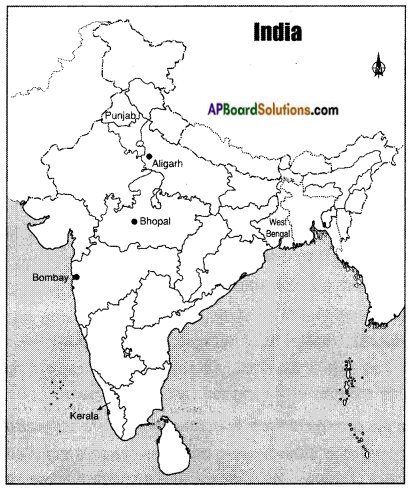AP State Syllabus AP Board 8th Class Social Studies Important Questions Chapter 19 Social and Religious Reform Movements.
AP State Syllabus 8th Class Social Studies Important Questions 19th Lesson Social and Religious Reform Movements
Question 1.
Compare the efforts of Narayana Guru and Jyotiba Phule. What similarities do you see between them?
Answer:
- Both opposed caste system.
- Both established many schools.
- Both opposed the supremacy of Brahmins.
Question 2.
Recall the teachings of Buddha with regard to the caste system.
Answer:
Buddha preached that ‘All are equal’. He opposed caste and religious discriminations. He treated all his followers equal.
![]()
Question 3.
What are the similarities in the approaches of Gandhiji and Ambedkar towards dalits?
Answer:
- Both worked for dalits.
- Both were the members of Congress Party.
Question 4.
Do you find any religious idea advocated by the above reformers which was not part of the Bhakti Movement?
Answer:
No. All the reformers advocated the religious ideas of the Bhakti Movement only.
Question 5.
Do you think dalits have equal access to temples, water sources and schools today? What problems do they still face?
Answer:
At present dalits have equal access to temples, water sources and schools. To say frankly they have equal access and reservations also. So we can say that there were no social problems to them.
![]()
Question 6.
What did Ambedkar want to achieve through the temple entry movement?
Answer:
Ambedkar wanted to say that ‘All are equal before God and everyone has rights on God”.
Question 7.
Do you think today equal importance is given to the education of girls or do girls still face discrimination?
Answer:
Equal importance is given to girls education with boys. To be frank the girl enrolment is more than boys in some schools and colleges. But in some families girls face discrimination, mostly in some backward states.
Question 8.
What problems do girls face in getting educated which boys do not face?
Answer:
- Girls are not encouraged for higher education.
- Girls are not permitted to far off places for education.
- Some courses are only meant for boys.
![]()
Question 9.
To what extent has the treatment of widows changed today?
Answer:
We can say that the attitude of the society is changed. Widows are treated equally with other women. Their elders are only arranging remarriages for them.
Question 10.
Do dalit girls and Muslim girls face special problems in education even today?
Answer:
Nowadays we seldom hear such a news from newspapers that dalit girls are facing some problems from others. They are also receiving education in classrooms along with others. Muslim girls also have separate schools. They are also studying without problems.
Question 11.
Who founded Brahmo Samaj in combined Andhra Pradesh?
Answer:
Veeresalingam founded Brahma Samaj in combined Andhra Pradesh.
![]()
Question 12.
On what did Veeresalingam concentrate all his efforts and energies?
Answer:
Veerasalingam concentrated all his efforts and energies on the widow remarriage and abolition of child marriage.
Question 13.
Why was Veeresalingam called ‘Gadya Tikkana’?
Answer:
He was called ‘Gadya Tikkana’ for his writings in prose.
Question 14.
How would the feeling that the dalits were the orginal inhabitants of Telangana and Andhra have helped in boosting the confidence of the dalits?
Answer:
The feeling would raise the confidence in dalits. This confidence would strengthen them in fighting against the discrimination. That led them to their success.
Question 15.
Did all women get the right to vote in independent India?
Answer:
Yes, all women get the right to vote in independent India.
![]()
Question 16.
Locate the following in the given India Map.
- West Bengal
- Punjab
- Bombay
- Aligarh
- Bhopal
- Kerala
Answer:

![]()